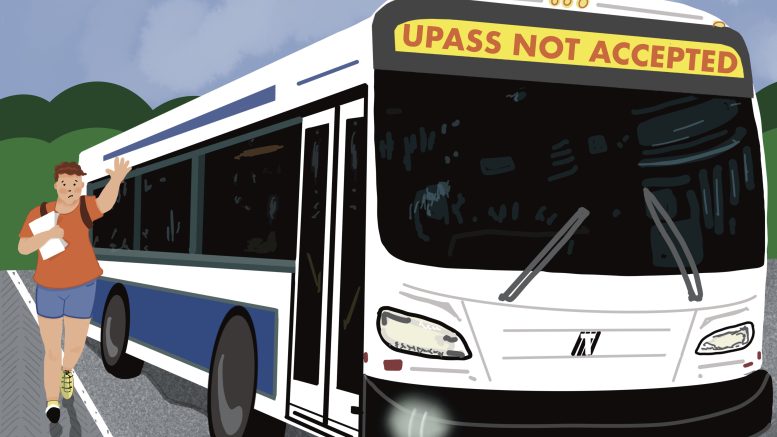Most students are probably ecstatic to be out of school come the summer break.
Without looming deadlines or back-to-back cramming sessions to worry about, I imagine most students’ academic anxieties are replaced with a surge of relief as soon they set foot off campus. With the sun on their face and a head full of daydreams about summer fun, summer break brings them the joy and excitement that only comes from finishing school for the year.
I’ve never once experienced that. For me, the summer break is a season of anxiety that could be improved simply by making the U-Pass functional year-round for full-time registered students.
As it stands, the U-Pass is only active over the academic year from September to April. What’s more, the pass is only available to full-time students and is paid for alongside tuition. During the spring and summer, the pass remains active but is completely emptied, leaving its holder without fare until Sept. 1, when it is reactivated automatically.
Starting in the fall 2020 term and ending in fall 2022, the U-Pass became unavailable on the assumption that students didn’t need it with the education format changing to remote learning.
However, it was during this time that I realized that I did in fact need the U-Pass. I remember struggling to put together enough bus fare to get my vaccine doses and to pick up COVID-19 tests that were not yet readily available. Often I could make it to my appointments but had to beg transit drivers to let me on the bus for free so I wouldn’t freeze to death in -30 C weather on the other side of the city.
These circumstances didn’t change for me once we returned to in-person classes. In fact, they got worse.
Like so many other students at the U of M, I don’t just use the U-Pass to get to my classes or pick up textbooks. Over the past few years of my student career, I’ve used the U-Pass to get to interviews, part-time jobs, medical appointments, therapy, the bank, the Manitoba Student Aid office, grocery stores and even just to visit my loved ones across town.
I am forced to squeeze all of these things into the academic year while I juggle full-time coursework because the lack of affordable transportation in the summer means I have to start sacrificing my needs. That period of time fills me with looming dread for when summer comes.
The U of M’s student population is not just made up of 19 or 20-year-old students who live at home while pursuing education. My existence as a mature student, alongside other mature students and students completely on their own fending for themselves, proves that.
There are students who cannot afford to pay for one month’s worth of fare or to continuously load their U-Pass with cash from their own pockets. It sometimes feels like our student union forgets this.
Over the years I have felt like UMSU puts a priority on social events. While I enjoy attending the occasional school spirit activity, I feel that UMSU’s focus on these events shows less that students are being prioritized and more that they’re being capitalized on by a union that runs itself like a business.
The events or initiatives that make me feel cared for are the ones that have a no-cost barrier and involve direct action — working to achieve goals by doing something tangible — like the free breakfasts UMSU hosts during the first week of school, which have saved me from starvation many times before.
Even the simple act of improving supports for student clubs, spaces where students can find solace and support in one another at little to no cost, could assist in improving the well-being of students. These are future steps however, and I feel that the first step is figuring out a suitable transit operation for the spring and summer.
It may appear complicated on paper, but personally I’d even be willing to pay more for my U-Pass if it meant I could use it year-round as a full-time student. Perhaps UMSU could find a way to advocate for the U-Pass to be activated during spring and summer semesters too. Maybe the money they collect from various events and parties it hosts could fund an initiative like that.
The seeds should be planted now so that future students, or those of us who won’t be graduating for a few years yet, can benefit from them. I firmly believe making these changes would improve the quality of life for many — if not all — U of M students.
In the end, what I really want is for UMSU to start putting the “union” back into student union. We don’t just need dog therapy in University Centre to treat exam stress or Bison Bashes to raise our spirits, we need community action from the union created to care for and protect us.



